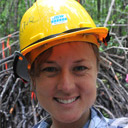
Camille Dehu interviews Mama Odette in her house in Ngon village, Ebolowa. Ollivier Girard/CIFOR
Thwack! Mama Odette brings the machete down hard on her dirt floor, neatly splitting a bush mango in two. While she works, she talks with Camille Dehu, a Masters student and intern with the Centre for International Forestry Research (CIFOR) in Cameroon.
“Nuts are getting harder to find, they are more rare now,” Mama Odette says, hacking apart another fruit.
Camille has spent a month in five villages bordering a logging concession in southern Cameroon, collecting data for a joint CIFOR/Bioversity project that is probing tensions between logging companies and local communities.
‘Beyond Timber’: Reconciling the needs of forest dependent people with those of the logging industry aimsto identify which forest species are in demand both by timber companies, and villagers collecting non-timber forest products (NTFPs) used for food, shelter and medicine. The ultimate aim, Camille says, is to develop sustainable forest management plans that benefit both parties.
“We are here to see to what extent people rely on forest products for their livelihood,” she says.
“We are not here to judge. We are meeting the bushmeat hunters and the illegal loggers, and we are trying to understand why they do that and what could be the alternatives.”
“It’s important because now you have conflict between the people using the forest products, and the logging industry.”
It’s the first stage of a project that will compare villages like Mama Odette’s with others in Gabon and the Democratic Republic of the Congo (DRC).
While Camille works with a Cameroonian researcher on the social and economic aspects of the problem, a team of nutritionists is analysing the importance of forest products in people’s diets, and a group of foresters is examining the impact of logging on the availability of key species.
“When you work in tropical forests, you work with both people and the forest, so it’s important to have this multidisciplinary team,” she says.
Her conversation with Mama Odette is just one of the research techniques used by the team.
“When we first arrive in the village we organise a focus group discussion, where we gather people together and get them to discuss what are the different NTFPs they are using, what are the main activities, what are the main problems and what is the nature of the relationship with the logging company,” she said.
“But then there are sensitive issues that people don’t want to discuss in front of other people, so we go inside the house, and we talk with them.”
Camille says the team has returned to each village three times to build trust and try to elicit more information.
We are not here to judge. We are meeting the bushmeat hunters and the illegal loggers, and we are trying to understand why they do that and what could be the alternatives.
“Each time we come back, people are more friendly, and also they are more confident, so they can tell you more.”
“The first time, there was no illegal logging in the village. The second time, “Yeah, maybe…” And the third time they were explaining everything to us.”
Over lunch in the chief’s house – spicy stewed porcupine and rice – Camille says sharing meals with the villagers is an important part of life in the field.
“Here in the forest you cannot find beef, obviously, so if you want to eat meat it will have to be bushmeat: Porcupine, pangolin, antelope, anteater, even snake.”
“At the beginning it was tough, because you have to cope with problems like alcoholism, and as a white person, you are treated differently, and sometimes people beg more to you than to the Cameroonian researchers,” she said.
And there are some extra challenges associated with being a 27-year-old French woman.
“You receive a lot of marriage proposals too!”
“But in the end you just have to joke about it. It’s a rich experience, but you have to learn how to work in the village. It’s not obvious straight away.”
For more stories from the Congo Basin, click here.
We want you to share Forests News content, which is licensed under Creative Commons Attribution-NonCommercial-ShareAlike 4.0 International (CC BY-NC-SA 4.0). This means you are free to redistribute our material for non-commercial purposes. All we ask is that you give Forests News appropriate credit and link to the original Forests News content, indicate if changes were made, and distribute your contributions under the same Creative Commons license. You must notify Forests News if you repost, reprint or reuse our materials by contacting forestsnews@cifor-icraf.org.












